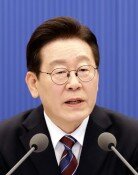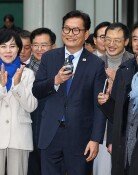The Ministry of Unification faces an identity crisis
The Ministry of Unification faces an identity crisis
Posted July. 04, 2023 07:55,
Updated July. 04, 2023 07:55
The Ministry of Unification is facing increasing turmoil. Officials within the ministry claim that the current state of unrest surpasses the unsettled atmosphere before the launch of the Yoon Suk Yeol administration last year when there were discussions about shutting down the ministry. One official remarked, "Back then, it appeared to have a solution if we could avoid closure, but now it seems there is no way to overcome the current predicament."
The mission of the Ministry of Unification, as stated on its website, includes the following objectives: establishing policies on unification, inter-Korean exchange and cooperation, and humanitarian assistance; analyzing the situation in North Korea; promoting education and awareness about unification; and taking responsibility for all matters related to inter-Korean relations and unification. This mission is also outlined for the Minister of Unification in Article 31 of the Government Organization Act.
The ministry is experiencing unrest due to a significant upheaval in its identity. Following Kim Young-ho's nomination as Minister of Unification, he said he would "endeavor to solve the North Korean nuclear problem with principle." This statement contrasts with the first Unification Minister, Kwon Young-se, who mentioned in his inauguration speech that he "plans to cooperate with North Korea unconditionally." On his first day, the nominee's mention of "principle" implies a firm stance on pressing human rights issues in North Korea. Moreover, the ministry appointed a Vice Minister who is a seasoned diplomat with expertise in U.S. affairs and a human rights advocate. The decision to change the Office of the President Unification Secretary to a non-unification ministry official has caused anxiety within the ministry, with some expressing concerns about "actions that distrust the role of the existing ministry."
President Yoon's message on Sunday exacerbated the existing anxiety. He criticized the Ministry of Unification, stating, "The ministry has been providing unwarranted support to North Korea, which is unacceptable." As a result, he ordered a comprehensive overhaul of the ministry. An official from the Presidential office explained, "The ministry has persistently displayed passivity in response to North Korean provocations, which has caused discomfort for the President." Furthermore, the official remarked, "The President's message was relatively restrained." Another source indicated that the ministry is expected to undergo extensive changes, essentially equivalent to its dissolution.
The notion that the ministry is useless is not new. Particularly when relations between South and North Korea are strained, criticism against the ministry, which focuses on inter-Korean exchange and cooperation, emerges within and outside the government. Therefore, the ministry must redefine its identity to overcome this useless perception. Moreover, it would be misguided to remain passive at a time when North Korea is clearly escalating its provocative nuclear actions.
Even within the ministry, officials agree on the need for change. However, it is true that there are also complaints and anxieties. Some cast doubt on the actions of the presidential office, suggesting that it is expressing its dissatisfaction with North Korea through the ministry. Others feel a sense of shame as the very existence of the ministry, which has been contributing to inter-Korean relations, is being questioned.
So the key point here is planning and speed. An individual who desires change also needs well-defined plans and the flexibility to adjust the pace of change. This also holds true for the Ministry of Unification, a large organization established in 1969. Without transparently sharing comprehensive plans and a clear direction, stigmatizing it as a problematic organization will only create unnecessary resistance from within.
To enhance the fundamentals of the ministry, it is crucial for the nominee to formulate a thorough roadmap. Active communication with the ministry's employees is also vital in this process.







